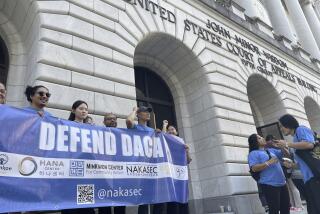High Court Hears Issue of Migrant Detentions
WASHINGTON — Civil rights lawyers urged the Supreme Court on Wednesday to strike down a law requiring immigrants convicted of certain crimes to be locked up indefinitely -- even after serving their sentences -- until a deportation hearing is held.
The case pre-dates the Sept. 11 attacks. But it puts the court in a debate over the rights and treatment of immigrants and raises some of the same civil liberties questions posed on behalf of foreigners since the government has taken steps to better track them after the attacks.
It’s the first time since the attacks that the justices debated a case with direct implications for the government’s war on terrorism, although the attacks weren’t mentioned during the arguments.
Solicitor General Theodore B. Olson told justices that the case, Denmore vs. Kim, 01-1491, is about public safety and immigrants who break the law and no longer have a right to be in America.
The justices will decide by this summer whether the U.S. can lock up without bail immigrants who have been convicted of certain felonies, served their time and are awaiting deportation proceedings, which can take years.
Many members of the court seemed untroubled by a 1996 mandatory detention law that does not allow for a bond hearing at which immigrants could try to win release by arguing they are not a public safety risk.
American Civil Liberties Union attorney Judy Rabinovitz told justices that some people who are jailed are not dangerous and would not flee if they were released on bail. She also said that not all immigrants who are imprisoned end up being deported.
Chief Justice William H. Rehnquist said Congress had a valid reason to impose the mandatory jailings -- data showing that more than 20% of criminal aliens who were allowed to remain free during deportation proceedings fled.
“We don’t allow people to be locked up based on averages,” Rabinovitz responded in a sharp exchange with the chief justice.
More to Read
Sign up for Essential California
The most important California stories and recommendations in your inbox every morning.
You may occasionally receive promotional content from the Los Angeles Times.










